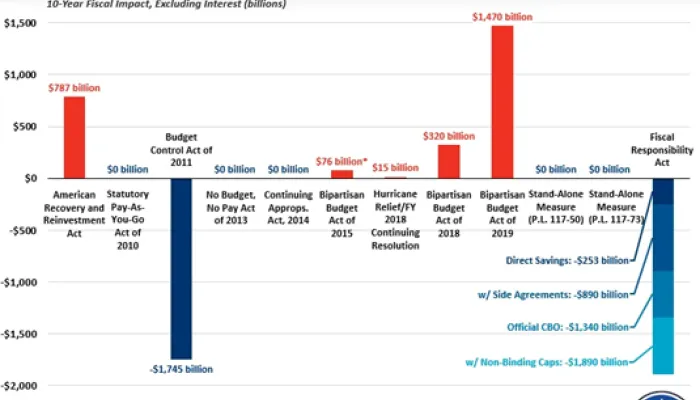Oil in the Gulf Isn’t the Only Threat That Needs to Be Capped
Lawmakers have railed against the inability to stop the leaking of oil into the Gulf of Mexico, yet they are having no better success in staunching the flow of red ink. Congress needs its own containment cap to suppress spending and tax cuts that are deficit-financed.
At the end of last month the House narrowly passed tax extenders legislation after scaling back its cost because members balked at the sizable portion that was not paid for. You may think that the Senate would see this as a sign that it is time to budget responsibly and pay for legislative priorities, but that seems as likely as the “top kill” working in the Gulf. The Senate now seeks to add spending and decrease offsets. The Senate bill has a $140 billion price tag with about $77.5 billion of that adding to the deficit.
Leaders in the Senate hope to pass by early next week their version of the bill including $24 billion in Medicaid aid to the states that was dropped in the House. The Senate will also look to reduce the taxation of carried interest provided for in the House version, diminishing one of the few offsets in the measure. The Senate version seeks to recoup the loss of carried interest revenue largely by raising the excise tax on oil from 34 cents per barrel in the House version to 41 cents. However, that money is obligated for the Oil Spill Liability Trust Fund to finance oil spill clean-ups. Maybe it should be renamed the Black Oil and Red Ink Mitigation Fund.
We are not saying that expanded unemployment benefits should not be extended, as called for in the bill. But we believe that such spending should be paid for, at least in the longer run so that it does not add to the long-term debt. Stabilizing the debt could aid the economic recovery by convincing creditors that the U.S. will not become Greece, thereby keeping interest rates lower.
The difficulty in using increased revenue as an offset illustrates that spending cuts must also be part of the offset mix. If lawmakers truly believe that the spending and tax cuts included in the legislation are important, they should work together to find other areas of the budget that can be sacrificed. One of the amendments offered to the bill is a proposal from senators Jeff Sessions (R-AL) and Claire McCaskill (D-MO) to institute a three year discretionary spending cap. That would be a good start. CRFB criticized the lack of pay-fors in the legislation and offered recommendations for longer-term offsets in a recent statement.


